United Nations Secretary-General Antonio Guterres said Sunday the Group of 20 was vital in the worldwide fight against the COVID-19 pandemic by cooperatively implementing equitable and sustainable recovery strategies.
The G-20 summit of the world's leading economic powers was hosted by Saudi Arabia. Owing to the pandemic the meeting was held virtually.
The world's richest nations promised to support poor countries whose economies have been badly damaged by the crisis - but gave few details about what spending would entail.
The virus has infected nearly 60 million people around the world since emerging in China in December and has killed almost 1.4 million.
"We have a moral obligation to ensure that the trillions of dollars for COVID-19 recovery - money that we are borrowing from future generations - does not leave them burdened by a mountain of debt on a broken planet," Guterres said.
"Our greatest defense against COVID-19 is solidarity and cooperation," the UN chief said. "Building an inclusive, sustainable and resilient future," he said.
"There will be no different and better future without stronger action now to provide the necessary liquidity and tackle the debt emergency of the most vulnerable," he said.
"It means strengthening the firepower of the International Monetary Fund and other international financial institutions in support of the developing world - including through a new issuance of Special Drawing Rights and the reallocation of unused SDRs," Guterres said.
It also means broadening the eligibility of the G-20 debt initiatives to all vulnerable developing countries, including the middle-income ones that need it, he said.
In a 12-page document released Sunday following the conclusion of the summit in Saudi Arabia member countries agreed to share resources and technologies to support recovery efforts.
"We are committed to leading the world in shaping a strong, sustainable, balanced and inclusive post-COVID-19 era," the document said.
During the summit leaders discussed possible solutions to the social and economic effects of the health crisis. Leaders agreed that most member countries were caught unprepared and certain vulnerabilities were exposed by the pandemic.
Since the pandemic hit, world central banks and governments have deployed more than $11 trillion in economic packages to help recoveries.






